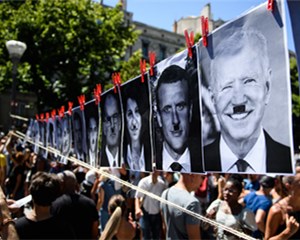Europe
歐洲板塊
French rhetorical hysteria
暴走的法國(guó)人
1789 and all that
諸如1789年
Why so many French people fear dictatorship and civil war
為什么這么多法國(guó)人害怕獨(dú)裁和內(nèi)戰(zhàn)
Venture into the chatrooms of French cyberspace or onto the streets of Paris, and the impression this summer is of a country on the brink of totalitarian rule or civil collapse, or both. In July the word dictature (dictatorship) surged tenfold on Google, in anticipation of a new "health pass" introduced on August 9th by President Emmanuel Macron. This makes full vaccination (or a negative covid-19 test) a condition of access to restaurants, bars, trains and other places.
走進(jìn)法國(guó)的網(wǎng)絡(luò)聊天室,走上巴黎的街頭,你會(huì)發(fā)現(xiàn)這個(gè)夏天的法國(guó)是一個(gè)正處于極權(quán)統(tǒng)治或公民崩潰邊緣(或者兩者兼而有之)的國(guó)家。由于法國(guó)總統(tǒng)埃馬紐埃爾·馬克龍預(yù)計(jì)將于8月9日推出新的“健康通行證”,今年7月“獨(dú)裁”一詞的熱度在谷歌上飆升了10倍。而全面接種疫苗(或新冠檢測(cè)呈陰性)將成為進(jìn)入餐館、酒吧、火車(chē)和其他地方的條件。
Nicolas Dupont-Aignan, a right-wing deputy, called the new pass sanitaire a "sanitary coup d'état". Michèle Rivasi, a Green politician, called it "apartheid". Protesters clutched placards with slogans such as "False pandemic, real dictatorship" and "Pass Nazitaire", or photos of Mr Macron with a Hitler-style moustache. A few wore yellow stars on which was written "non-vaccinated", eliciting widespread indignation. Joseph Szwarc, a 94-year-old Holocaust survivor, called the comparison "odious" and said he shed tears at the sight: "I wore the yellow star; I know what it was."
對(duì)于新的通行證,右翼議員尼古拉斯·杜邦-艾格南稱(chēng)之為“衛(wèi)生政變”,綠黨政治家米歇爾·里瓦斯稱(chēng)之為“種族隔離”,抗議者則高舉寫(xiě)有“傳染病是假,獨(dú)裁是真”和“納粹通行證”等口號(hào)的標(biāo)識(shí)牌,或者是馬克龍留著希特勒式胡須的照片。有些人胸前還佩戴寫(xiě)有“拒絕接種”字樣的黃色星星,引發(fā)公憤。約瑟夫·斯瓦克今年94歲,是“猶太人大屠殺”的幸存者,他稱(chēng)這種比較(抗議者將自己比作納粹德國(guó)時(shí)期的猶太人)“是可恨的”,他在看到這一情景時(shí)流下了眼淚:“我曾經(jīng)戴過(guò)黃色的星星,我知道那是什么。”

In April and May the phrase guerre civile (civil war) spiked on Twitter, after retired right-wing generals wrote an open letter offering to step in to save the country should it slide into chaos. A poll suggested that 58% of the French backed the officers, and nearly half thought the army should step in on its own initiative.
4月和5月,“內(nèi)戰(zhàn)”一詞在推特上爆火,因?yàn)橥诵莸挠乙韺④妭儗?xiě)了一封公開(kāi)信,表示如果國(guó)家陷入混亂,他們?yōu)榱苏葒?guó)家將介入。一項(xiàng)民意調(diào)查顯示,58%的法國(guó)人支持軍官們,近一半的人認(rèn)為軍隊(duì)?wèi)?yīng)該主動(dòng)介入。
Why is France so often convinced it is on the brink, and so prone to rhetorical hysteria? The country's disjointed and rebellious history is one answer. "Are we in 1789" is still a periodic headline in the press. And indeed, the prospect of disorder is not wholly fanciful. A culture of mass protest is deeper-rooted in France than in any other European country, and reasoned debate often gives way to factional theatrics and sabotage. Fifty years after the May '68 student uprising, gilets jaunes(yellow jackets) ransacked Paris. In July anti-vaxxers invaded a town hall in Chambéry, in the Alps, and vandalised vaccination centres.
為什么法國(guó)人總是相信自己正處于危機(jī)邊緣,并如此愛(ài)好言辭上的歇斯底里?答案就在法國(guó)支離破碎和叛亂的歷史當(dāng)中。“我們是在1789年嗎?”是法國(guó)報(bào)刊隔三差五就會(huì)用到的標(biāo)題。事實(shí)上,混亂的前景并非完全空穴來(lái)風(fēng)。在法國(guó),“大規(guī)模抗議”的文化比任何其他歐洲國(guó)家都要根深蒂固,理性的辯論常常讓位于派系表演和蓄意破壞。先是1968年5月的學(xué)生起義;50年后“黃背心”洗劫了巴黎;今年7月反疫苗者入侵了位于阿爾卑斯山尚貝里的市政廳,并破壞了疫苗接種中心。
Inflating fears of violence or totalitarianism may also suit some politicians. Many a French election campaign has been won on the promise of calm after chaos. Over four-fifths of the French say that feelings of "insecurity" will influence their vote at the presidential election next year, even though violent crime (sexual and domestic violence aside) has been falling for years and the murder rate is stable. Some 200,000 people grabbed headlines on August 7th by marching against the new health rules. Yet, after they were announced, over 8.5m quietly got vaccinated for the first time. As for allegations of dictatorship, Mr Macron put it this way: "If we empty words of their meaning, the risk is that we threaten our democracy itself."
一些政客也極度恐懼暴力或極權(quán)主義。許多法國(guó)大選都是在承諾了平息混亂后贏得的。超過(guò)五分之四的法國(guó)人表示,盡管暴力犯罪(性暴力和家庭暴力除外)多年來(lái)一直在下降,謀殺率保持穩(wěn)定,但“不安全感”仍將影響他們?cè)诿髂昕偨y(tǒng)選舉中的投票。8月7日,大約20萬(wàn)人參加游行活動(dòng)反對(duì)健康通行證,登上了新聞?lì)^條。然而,在他們被通報(bào)后,超過(guò)850萬(wàn)人悄悄進(jìn)行了第一次疫苗接種。至于對(duì)獨(dú)裁的指控,馬克龍是這樣說(shuō)的:“如果我們把它們的意義說(shuō)得空洞無(wú)詞,風(fēng)險(xiǎn)就是我們威脅到了我們的民主本身。”
譯文由可可原創(chuàng),僅供學(xué)習(xí)交流使用,未經(jīng)許可請(qǐng)勿轉(zhuǎn)載。











